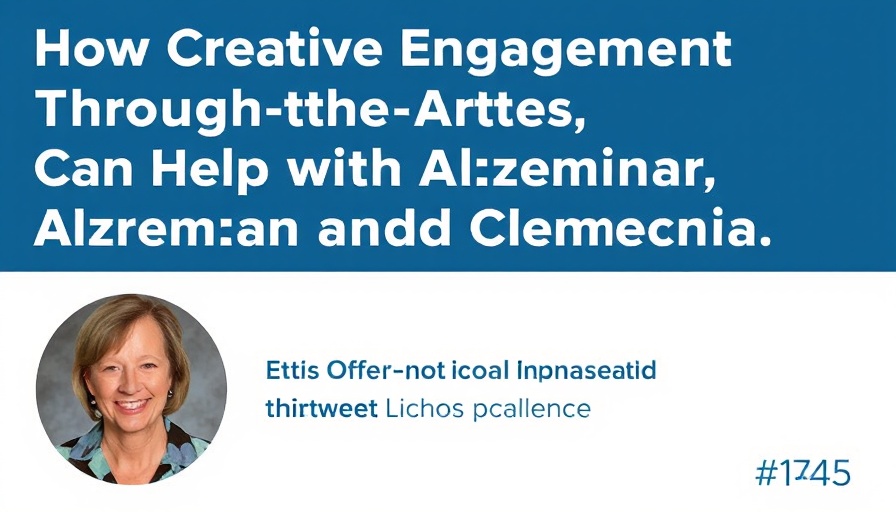
Harnessing the Power of the Arts to Combat Cognitive Decline
As our population ages, the prevalence of Alzheimer's and dementia grows, significantly impacting not only those diagnosed but also their families and communities. Recent studies have highlighted the role of creative engagement in combating these cognitive decline challenges. The arts—ranging from painting to music and dance—offer unique, non-pharmacological methods that may improve the quality of life for individuals facing these debilitating conditions.
Why the Arts Matter: The Science of Creative Engagement
Engaging with the arts stimulates brain activity, providing pathways for emotional expression and cognitive function. According to research, participation in artistic endeavors can promote neuroplasticity, enabling the brain to form new connections, which often helps those with Alzheimer's and dementia retain memories and improve their emotional stability. This engagement can lead to reductions in anxiety and depression, common co-morbidities among patients.
Real Stories: How Creativity Transforms Lives
Consider the case of a local art therapy program that connects trained artists with Alzheimer's patients. One participant, Judith, a former painter, found joy and recall through her brushes and colors, often sharing vivid stories from her past that seemed lost. A simple act of painting not only rekindled her artistic passion but also fostered meaningful interactions with caregivers and family members, helping them connect with her in unprecedented ways.
Types of Creative Engagements That Make a Difference
Various forms of artistic expression can be beneficial for individuals with cognitive impairments. Here are a few notable activities:
- Music Therapy: Featuring personalized playlists or group sing-alongs can evoke memories and emotions, promoting communication.
- Visual Arts: Painting, drawing, or sculpting allows for self-expression, which can be especially vital when verbal communication becomes challenging.
- Dance and Movement: Gentle movement through dance helps maintain physical health and encourages social interaction within group settings.
Future Insights: The Bright Horizon of Art Therapy
As we look ahead, the integration of arts in therapeutic settings appears promising. Many organizations push for funding and research into programs that incorporate creative engagement as part of traditional care plans. Not only do these initiatives aim to improve the quality of life for patients, but they also emphasize healthier activity for caregivers and families, fostering support networks that are essential for long-term wellness.
Actionable Steps for Incorporating the Arts into Daily Life
For families dealing with Alzheimer’s or dementia, consider the following steps to introduce creative activities into daily routines:
- Start Small: Introduce short music sessions that encourage patients to reminisce or sing along.
- Create Art Together: Dedicate a corner of your home for arts and crafts, enabling individuals to explore their creativity while spending quality time.
- Attend Classes: Look for community events or classes that offer art therapy options specifically designed for those dealing with cognitive decline.
By fostering an environment of creativity and engagement, you not only amplify the chances of enhancing cognitive functions for loved ones but also pave the way for profound human connections.
Final Thoughts: Embracing Creativity during Challenging Times
In the face of cognitive decline, engaging in the arts offers hope, healing, and connection. The stories of individuals like Judith inspire us to leverage creativity in helping those we love remain engaged with the world around them. Beyond sustaining memories, these artistic endeavors can bring laughter, joy, and a sense of belonging to an otherwise isolating experience.
Consider exploring local classes, starting a creative project at home, or simply playing music that holds meaning for your loved one. The connections forged through shared artistic experiences offer powerful avenues for enhancing quality of life. Don’t hesitate to embrace the arts; they could be the key to unlocking hope!
 Add Row
Add Row  Add
Add 




Write A Comment